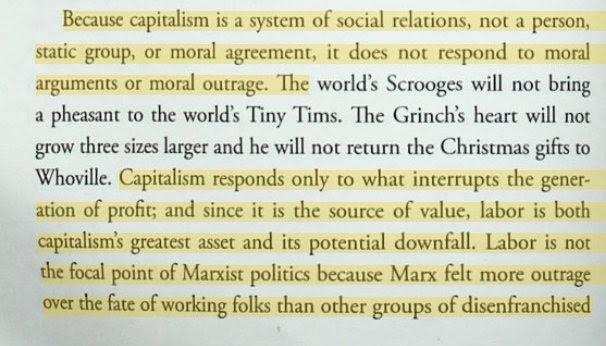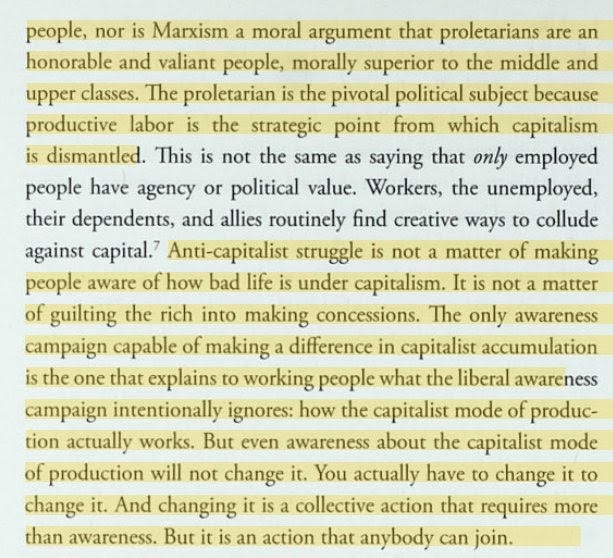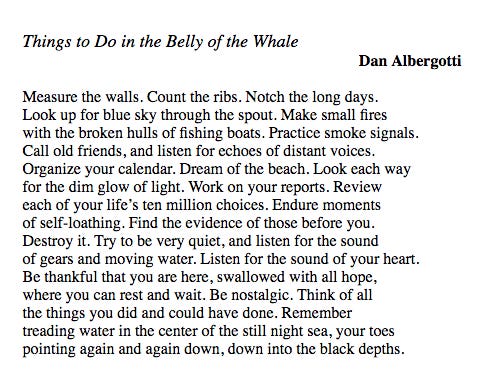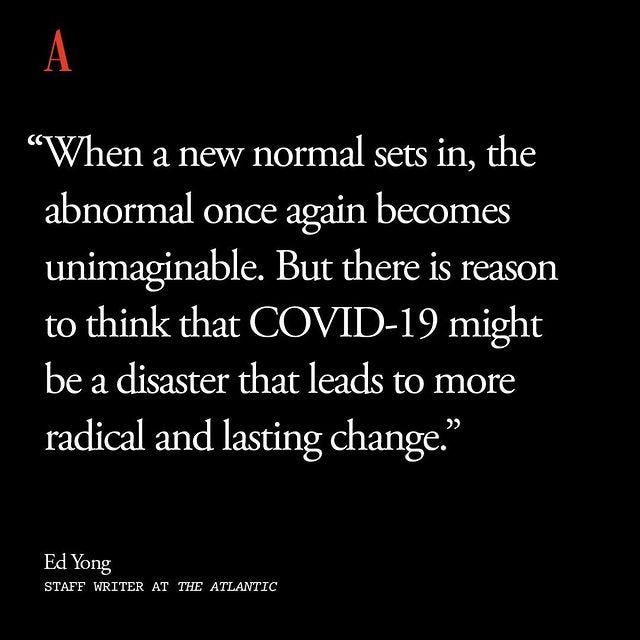You Actually Have To Change It To Change It

In my increasingly regular role as the spectre at the feast, I find it necessary to explain the hesitations I have surrounding things that make other people feel good. In this instance I’m talking about the trend I’ve seen lately in which people (with good and understandable intent) share sentiments like the one below:
All of these outcomes are certainly possible—maybe even likely, as Ed Yong suggests. But in the (pardon me) virality of posts like these lies something I’m less comfortable with: a notion that these outcomes are inevitable, that if we sit and wait and educate ourselves enough, good things—especially the things that count on other people—will come to pass.
I don’t think that’s a particularly useful framework for looking at the world and I think it’s tied up in the essentially liberal idea that enough factual appeals to enough powerful people can and will move the needle. Fund this, don’t punish people for that, model for us all what good citizenship looks like. Say it this way and not that way, make me feel reassured in the steadiness of your hands.

These demands and the things Ed Yong lists above are largely reactions to existing problems. They do not require envisioning a world that is fundamentally different, only tweaked slightly here and there to accommodate a few changing needs. But there is already such a howling pit of need and misery at work here! This crisis did not create new problems in any meaningful sense. It dramatically exposed the rot that was already there.
Ralph Miliband highlighted the differences between the aforementioned liberal approach and alternative in his Marxism and Politics:
In the liberal view of politics, conflict exists in terms of "problems" which need to be "solved". The hidden assumption is that conflict does not, or need not, run very deep; that it can be "managed" by the exercise of reason and good will, and the readiness to compromise and agree...The Marxist approach to conflict is very different. It is not a matter of "problems" to be "solved" but of a state of domination and subjection...Ultimately, stability is not a matter of reason but of force...and the notion of genuine harmony is a deception or a delusion.
Now, this force doesn’t have to be literal, physical force. On at least two other occasions I’ve quoted heavily from Peter Camejo’s “Liberalism, ultraleftism, or mass action” in here; I’m going to do that once more, briefly, to show you what I mean.
You see, if you walk into a store that’s selling refrigerators, there’s nobody in that store to stop you from wheeling out a refrigerator. How many guards do they have at the door? Probably zero. They have some salesman who walks up to you. It wouldn’t take much to get him out of the way. You could wheel out four or five of them.
Now, the reason you don’t go wheeling refrigerators out of stores every day of the week is because there’s a certain power ensuring that that refrigerator stays inside the store unless they get money for it.
There are things like the police, the courts, and jails behind it. But this power isn’t apparent when you look at the refrigerator and at the little salesman saying, “You’d better not take that.”
In a similar way, when a union bureaucrat gets up at a rally and says, “You’d better stop the war,” it isn’t some helpless little guy on the street talking. There’s a lot of power behind that plea.
If you don’t understand the relationships which exist in this society, because they’re not apparent at first sight, you can make some tragic errors.
Okay, gotta beat you over the head with one last bit of analysis that I think really settles the point. Better than I ever could, certainly. Wondering why billionaires aren’t passing out cash hand over fist to needy people, wondering why mega corporations aren’t taking care of their workers, gratis? Read this, from Holly Lewis’ The Politics of Everybody.


The point I’m trying to make with all this is thus: Things are only different when we make them so. And goddamn, people seem to be coming to that realization, en masse, as it relates to their workplaces. There has been a barrage of stories this week of workers from GE to Amazon to Instacart walking off the job—not just in protest, but in the pursuit of material demands on their employers, demands which are made more urgent in light of this crisis (safety, compensation, healthcare) but also exist beyond it. And if we want these needs to continue to be met beyond the scope of this crisis, we have to realize that these are not spontaneous and disorganized acts of rebellion, like a workplace version of those (equally false) “the dolphins are coming back because we’re staying inside and not polluting!” posts. These strikes and walkouts are the fruits of organizing, which is an unsexy task on the best of days and doesn’t get a tenth of the credit for changing the world that someone like Andrew Cuomo gets for showing up on TV sounding reasonably human.

There is no cavalry. I mean there is, in some ways, like the Cuban doctors being deployed to Italy to help care for the sick. (Notably they’re not allowed in America, for the second straight historic crisis, for reasons that have never been worth it and which have been overtly silly for at least four decades.) But there is no single elected official, no matter how calm and steadfast they may seem, with the power to put the country right, or to guarantee that the minimal freedoms and concessions gained during this pandemic will be kept and protected and expanded afterward.
It’s like Eugene Debs said:
If you are looking for a Moses to lead you out of this capitalist wilderness, you will stay right where you are. I would not lead you into the promised land if I could, because if I led you in, some one else would lead you out. You must use your heads as well as your hands, and get yourself out of your present condition; as it is now the capitalists use your heads and your hands.
I don’t mean to put this all on the liberals, at least not those without any power. Many Leftists are making a different flavor of this same misstep in the belief that somehow a national rent strike will just happen. I’ve heard it pointed out, correctly, that there is an ocean of difference between being literally unable to pay rent and making a strategic political decision not to pay rent. Mass inability to pay rent is not the same as a rent strike, in the same way that being laid off is not a labor strike. Intentional organization that leads to actions that show the collective power of the people is the point. If you’ve already been laid off or evicted you have very little power to exercise.
Which is not to say that we can’t or won’t get there! And in fact one of those great rotten truths being exposed by the present moment is that our system of rentiers and renters is not a sustainable, desirable, or advisable one. But we must again steer clear of the mistaken thinking that any of this can or will happen organically, a spontaneous blossoming of consciousness and anger being directed toward productive ends. Life is rarely so neat—and to believe that this will happen, with or without you, is an abdication of the responsibility to take part.

E.B. White once said that
If the world were merely seductive, that would be easy. If it were merely challenging, that would be no problem. But I arise in the morning torn between a desire to improve the world and a desire to enjoy the world. This makes it hard to plan the day.
I’ve had the latter half of that quote on my bedroom wall for a couple of years now. But it’s starting to come into focus for me that there won’t be things left to enjoy in the world unless we start improving it. That makes the decision a little bit easier.
This has all been very heavy and perhaps even a little preachy, so allow me to leave you with the most relatable poem I’ve read in some time.

Take care of yourselves out there. In there. Wherever. And please pass this newsletter along to anyone you think might enjoy it.
-Chuck




